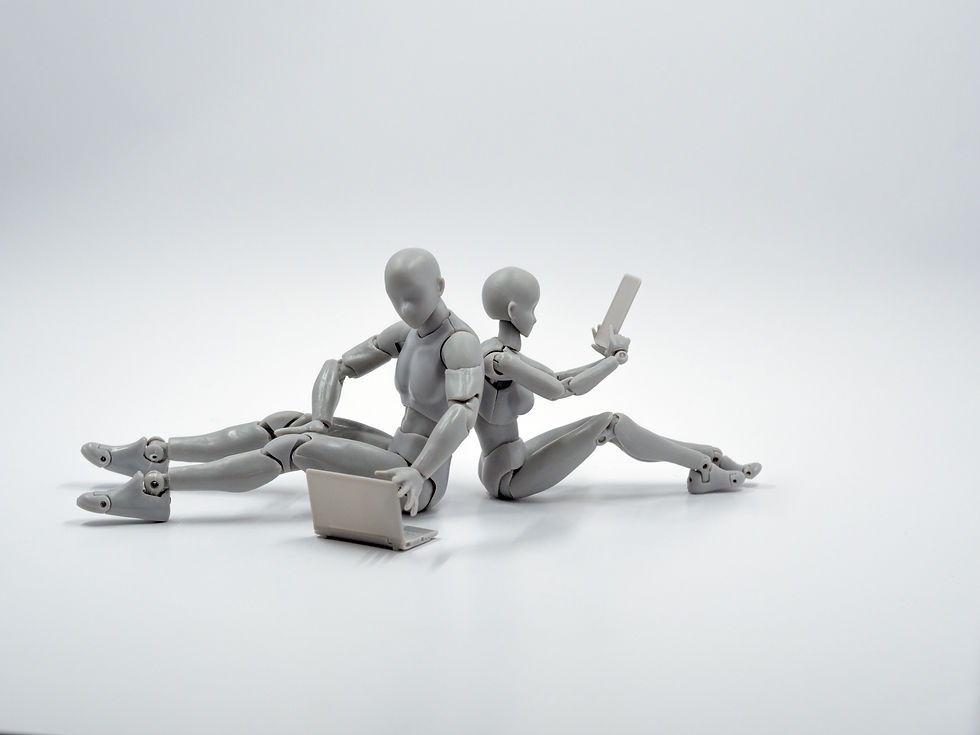AI Church Service: Retrospective and Summary
- Anna Puzio
- Jun 16, 2023
- 5 min read
Updated: Jul 2, 2023
First AI Church Service at the German Protestant Kirchentag
Please note that the following statements are quotes from me and should be properly cited.

First AI Church Service: A Worship Service Generated by AI
The AI Church Service, held on June 9, 2023, at the German Protestant Kirchentag in Nuremberg, marked a significant milestone in the church's engagement with technological advancements. Taking place at St. Paul's Evangelical Lutheran Church in Fürth (near Nuremberg), the service lasted for 37 minutes and was generated by artificial intelligence (AI). The sermon, blessings, prayers, and music were all produced by AI, utilizing accessible applications such as mypipio, AIVA, OpenAI, and DeepL. The service itself was conducted by avatars projected onto a screen, without any human intervention. Prior to and after the service, there were sessions for explanation, education, and discussion.

A Milestone Achievement

The AI Worship Service represents a significant milestone for churches that have been slow to embrace technological transformations. The advent of AI, particularly with the emergence of ChatGPT in 2022, sparked a wave of enthusiasm for AI in various fields, including theology. However, the exploration and utilization of technology in Christian theology and religion still lag behind. Perhaps this AI Worship Service has contributed to furthering theological and religious engagement with AI.
It is worth noting that the AI-generated prayers and sermon lacked substance and persuasiveness. Present-day AI is incapable of providing theological interpretations. The AI used in the service lacked personality, gestures, facial expressions, and movements. Religious statements were not connected to personal life experiences. Nevertheless, it is foreseeable that AI will become more personal, human-like, and emotionally impactful in the future, which will bring about new ethical challenges.
Reactions
The AI Worship Service garnered significant attention, as evidenced by the long queue outside the church and the filled pews—a sight rarely seen in contemporary worship services. Hundreds of people participated, curious about what to expect. This interest reflects the willingness to engage with AI in a religious context and to experiment with new forms of worship.
During the service, some attendees responded to the AI-generated prayers and blessings, standing up to join in prayer. Others found amusement in the AI's performance and remained seated during prayer.
Opinions were divided after the service, leading to emotional and passionate discussions. This is not surprising, considering the polarizing nature of technology discourse in society, with opposing views of technophobia and techno-enthusiasm. Reactions to the AI Worship Service ranged from laughter, amusement, rejection, to devaluation. Technology skeptics, who typically fear AI's development and emphasize its dangers, claimed that the AI was dull, superficial, and inadequate.
However, there were also positive voices that recognized the potential benefits of implementing AI in religious communities. I, too, strongly advocated for this perspective.
Excerpt from the worship service:
My Statements on AI, Church, and Worship

More AI in Churches in the Future
It is evident that in the future, an increasing number of worship services will be produced using AI. However, AI still heavily relies on human input and integration into the worship service. Its implementation also depends on the technical proficiency of those involved. As AI becomes more personalized, emotionally engaging, lively, and authentic, we can expect to see more worship services created with AI, much like how we currently utilize ChatGPT for text production. The AI Worship Service can be expanded further with the inclusion of more AI-generated visuals, virtual and augmented reality (e.g., VR headsets), lighting, and enhanced interaction and communication with AI.
One of my research areas focuses on religious robots, which are already being utilized in some religions. These robots can engage in religious conversations, accompany prayers, provide guided tours of religious buildings, impart information about religions, and conduct religious ceremonies.
The use of AI in the religious domain will require initial education and labeling obligations.
No Replacement for Interpersonal Connections
However, this endeavor is not about mere "replacement." The fear of replacing human interactions is a major concern for many people regarding AI. The AI Worship Service, like AI itself, did not seek to replace but rather to explore and experiment. AI should be utilized for the functions it excels at, while recognizing that our relationship with AI and technology will become increasingly intense yet distinct from our relationship with humans, allowing us to employ them differently.
Humans and Bodies: Diversity
My research focuses on the anthropology of technology and technology ethics. Technological anthropology examines humans within the context of technology, while technology ethics explores how technology should be responsibly designed and used.
What does it mean to be human in the face of AI? AI and technologies convey certain images of humanity. What images of the human being do they convey? How does AI change our understanding of human beings?
Moreover, AI and technology also influence our perception of the human body. We have the capability, and perhaps the necessity, to ascribe a body to AI. However, which body should we choose?
There is no singular notion of the human body but rather a diversity and plurality of bodies and individuals. It is crucial for responsible technology to account for this diversity, which is currently not adequately considered in technology discourse.
AI for an Inclusive Church

Although the executed form of the AI Worship Service left many attendees feeling that something was missing, the implementation of AI in churches and religious communities can offer numerous advantages. For instance, AI can contribute to a more inclusive church by transcending the limitations of time, space, and physical bodies, providing a broader range of access. Diversity plays a significant role in this regard. To responsibly design and employ AI, ethical deliberation is essential.
For more information on the fields of technology anthropology and technology ethics, I invite you to explore my research website.
Photo Gallery
To watch the AI Church Service:
To watch the AI Church Service along with the panel discussion:
Literature

The Book "Alexa, wie hast du's mit der Religion?" ("Alexa, How Do You Feel About Religion?") (German/English) delves into the intersection of religion, technology, and AI. It can be downloaded for free from the publisher's website: https://www.wbg-wissenverbindet.de/shop/43727/alexa-wie-hast-du-s-mit-der-religion
(Further information can be found under the "additional information" tab).
The book includes contributions from anthropology and ethics, as well as my theses on AI and religion and my article on religious robots.
Media Coverage
The AI Church Service garnered international attention, with various media outlets reporting on it worldwide:
Links
- U.S.News: Can a Chatbot Preach a Good Sermon? Hundreds Attend Church Service Generated by ChatGPT to Find Out, 10.06.23
- FOX2, FOX8: Can a chatbot preach a good sermon? Hundreds attend church service generated by ChatGPT to find out, 10.06.23, 11.06.23
-AP News: Can a chatbot preach a good sermon? Hundreds attend church service generated by ChatGPT to find out, 10.06.23
- BR24: Nach Kirchentags-Predigt: Kann KI in Kirchen helfen?, 13.06.23
- ServusTV, Guten Abend Deutschland: KI predigt Gottesdienst, 12.06.23
https://www.servustv.com/aktuelles/v/aat3c27kg5hma9k11zmy/
- Trending Topics: Aus Science Fiction wird Realität: Die KI-Gottesdienste sind da, 14.06.23
- ZDFheute: Kirchentag feiert erste KI-Messe: "Alexa, starte den Gottesdienst", 09.06.23
- taz: "Und ChatGPT sprach…". https://taz.de/Gottesdienst-durch-Kuenstliche-Intelligenz/!5939632/
Announcements prior to the AI Church Service
- Sonntagsblatt: ChatGPT hält Gottesdienst: Wie in der Kirche über den Einsatz von KI diskutiert wird, 13.04.2023
- Katholisch.de: Künstliche Intelligenz statt Pfarrer: Alexa, starte den Gottesdienst! 15.04.23 https://katholisch.de/artikel/44560-kuenstliche-intelligenz-statt-pfarrer-alexa-starte-den-gottesdienst
- Evangelisch.de: Alexa, starte den Gottesdienst! 10.04.23 https://www.evangelisch.de/inhalte/214532/10-04-2023/kuenstliche-intelligenz-alexa-starte-den-gottesdienst
- Kirche+Leben: Kann KI Kirche? Ein Gottesdienst mit ChatGPT, 12.04.23























Comments